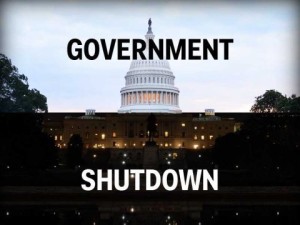For the past couple of weeks, the whole country has been buzzing about the government shutdown. Although the term is used so often on Meems and Facebook, most don`t know what a government shutdown really means. Initially, when I started this article I realized that it would be in the best interest of readers to abandon partisanship, which I have to admit is difficult.
What is the government shutdown?
The whole country has been groaning since October 1st, as if our world was going to end, using this ‘government shutdown’ term. Well, because of a couple of knuckleheads in Congress, this entire body of legislators upset the American people by halting the flow of operating funds to government agencies. As a result approximately 800,000 federal employees were furloughed, while 1.3 million employees were forced to work without pay. In simpler terms, Congress was so obsessed with bickering that they ignored their responsibilities to those they were elected to represent. Countless agencies like the EPA (Environmental Protection Agency), FDA (Food and Drug Administration), and Department of Homeland Security were either partially opened or completely closed. This left our country and its citizens susceptible to any sort of attack, might it be a terrorist bombing or a food-borne disease outbreak leading to deaths. So frankly, the government shutting down does seem pre-apocalyptic.
What happened to the workers who were furloughed? When one gets “furloughed”, do they receive pay? Who ran these partially open agencies when they were open, and were they compensated? Being furloughed means a worker is granted a temporary layoff by their employer for an indefinite amount of time, which is what happened in the case of our federal workers. In this circumstance, furloughed federal workers might or might not have gotten paid after they returned to work fifteen days later when the government reopened. According to CNN Money, the amount of money these employees may be owed could be as much as $115 million a day collectively. But this is only if furloughed workers are granted retroactive pay. This decision is left up to our “wonderful” and “productive” legislature.
Those lucky federal workers that didn’t get furloughed suddenly discovered how important they were. Those agencies affected by the shutdown furloughed workers based on their level of importance. If your job was considered crucial you got to keep it, if it was deemed unimportant you were furloughed. Expert legal advice can help to safeguard your federal and state rights.
How does the government shutdown affect the students of Manhattan Center?
Now, you may wonder, how does all this affect the students of Manhattan Center? It is quite understandable if students don’t believe they were affected by the government shutdown because the after-effects of the shutdown haven’t “trickled down” (as Republicans might say) yet. However, here are some ways that the shutdown did affect us. Those of us with younger siblings in daycare programs (such as Headstart), might have noticed that they stayed home every day from the 1st to the 16th of October. Tourist sites, specifically the Statue of Liberty, were closed; so for those fifteen days vendors selling overpriced goods to impressionable tourists were silently furloughed too, losing income needed to support their families. If “grandma” or “grandpa”, received social security payments that came late, they couldn’t pay bills on time, and Medicare payments (elderly health benefits) were either paid later than usual or not at all. New York is home to 26,696 federal employees, which means 26,696 families in this great state of ours were affected by this mess and any of their children could be attending our school.
Government shutdown ended on October 17, 2013, what happens now?
We hold hands, “sing kumbaya”, and hope that Congress never does this again…I wish! What happens from now onward is that since Congress was finally able to reach a short term agreement to reopen the government and even raise the debt ceiling, they will go back to arguing over a new budget due in eight weeks. If they can’t work it out, we will be back to that pre-apocalyptic scenario again, in which everybody loses. Since this is a money matter, the government shutdown cost American taxpayers (your parents) $24 billion in lost economic output, or 0.6 percent of projected annualized GDP (Gross Domestic Product) development, according to Standard and Poors (a wealthy credit agency). Yay! Let’s thank our elected officials once again for riding us roughshod over the fiscal cliff and losing more of our economy, no matter what political excuse they use to justify causing this loss.
On a serious note, it has been a privilege explaining the terms of the government shutdown. Just remember that decisions made on Capitol Hill in Washington D.C. do affect us in our homes wherever we live.
-Anonymous
